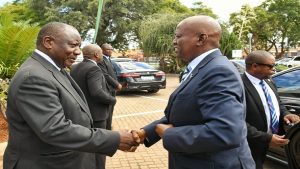Inviting the African Union (AU) to be part of the Africa Tourism Leadership Forum (ATLF) in Gaborone, Botswana, to look at ways to improve intra-Africa tourism, proved a futile exercise.
However, the snub was not going to stop important deliberations that took place at an event that African Tourism Partners (ATP) CEO Kwakye Donkor says was a tremendous success on many fronts.
The #ATLF2022 has not missed an opportunity to zone in on the need to improve road and rail transport considering the socio-economic issues of Africa by instead focusing on making air travel cheaper and easier. That’s according to ATP’s Kwakye Donkor.#SABCNews #ATLF2022 pic.twitter.com/pNjIwY3kth
— Sipho King K Kekana (@KingKAzania) October 26, 2022
Donkor says getting the private sector apex bodies across the continent under one roof to start collaborating has been one of the key successes.
“And there hasn’t been any platform of that nature. We managed to bring everyone together and the good news is that they have agreed to work together. We know it’s a long journey, however, the fact that they have agreed to work together is a great milestone,” he says.
Botswana President Mokgweetsi Masisi was in attendance on Day 2 of the event, encouraging hundreds of delegates that were physically in attendance and those taking part in proceedings virtually, to rethink tourism and devise strategies to make intra-Africa tourism sustainable.
As the 5th Africa Tourism Leadersship Forum comes to a close, Kwakye Donkor, the CEO of the Africa Tourism Partners, a Pan African tourism advisory, says the event has been a tremendous success. He was speaking on the sidelines of the forum in Gaborone. #SABCNews #ATLF2022 pic.twitter.com/Z7UT039Nh5
— Sipho King K Kekana (@KingKAzania) October 26, 2022
Donkor says Masisi’s presence was another success.
“For the president of the country seeing the relevance of this kind of platform, and coming to spend almost half a day with us, sharing his views and believing in the whole collective approach to drive intra-Africa growth was another major milestone. The other one, we managed to get policymakers to interact a bit more with the private sector, which normally doesn’t happen. So having CEOs of companies, as you saw, Airlink Chief Executive, we have a couple from other countries and it was also another success.”
Botswana President Mokgweetsi Masisi says the tourism industry in Africa and around the world is under pressure as a result of the #Covid_19 pandemic, new technologies, and constantly evolving client expectations.https://t.co/FHrxVhxADr
— SABC News (@SABCNews) October 25, 2022
AU no-show
The Pan-African strategist and expert in areas of tourism development, intra-Africa tourism development has lamented the engagement with the AU ahead of the event, even though he says it was not going to stop the forum from going ahead.”
“I’ll be very honest with you, our engagement with them, asking to come and support became a struggle. So, what we are doing, we are going with those that are willing to go with us and if at a point in time they are willing to come and join us, travel this journey (together), we will obviously be open to that because they are the leaders of the continent, (and) we cannot say no, but we can also not wait for them before we move.”
The AU has previously announced its aspirations of Africans seeing themselves as one people united under the ideals of Pan-Africanism, the physical and invisible barriers that have prevented the integration of Africa’s people removed.
Aspiration 2 of Agenda 2063 envisions “An integrated continent, politically united and based on the ideals of Pan-Africanism and the vision of Africa’s Renaissance” and Aspiration 5 envisions “An Africa with a strong cultural identity, common heritage, shared values and ethics”.
AU Agenda 2063
According to the AU, the Agenda 2063 flagship project ‘The African Passport and Free Movement of People’ aims to remove restrictions on Africans’ ability to travel, work and live within their own continent.
The AU hopes this will boost intra-Africa trade, commerce and tourism; improve trans-border infrastructure and shared development; facilitate labour mobility, intra-Africa knowledge and skills transfer, among others.
Donkor says despite this, they are not receiving any support from the continental body.
“We are not getting any support from anyone because the African Union is a policy decision-making body with 55, 56 countries. They got protocols they have to follow from ministers to presidents, it takes too long. You are talking about Agenda 2063, but people would like to travel now. We want people to be able to travel. So, while Agenda 2063 is a good thing, we must have something that we can do (now).”
“We are not getting support from the African Union” – Kwakye Donkor. This despite AU Agenda 2063 flagship project ‘The African Passport and Free Movement of People’ to remove restrictions on Africans’ ability to travel, work & live within their own continent. #SABCNews #ATLF2022 pic.twitter.com/8hodFnDQr1
— Sipho King K Kekana (@KingKAzania) October 26, 2022
Donkor says the conversation which took place during the forum will be taken forward with the relevant stakeholders going forward.
African Tourism Partners CEO Kwakye Donkor says the #ATLF2022 is not just a talk shop but that the conversations that took place during the forum will be taken forward with the relevant stakeholders. #SABCNews pic.twitter.com/QW1oiMQbln
— Sipho King K Kekana (@KingKAzania) October 26, 2022
Revenue leakages…
Earlier in the day, United Nations World Tourism Organisation (UNWTO)’s Regional Department for Africa Director, Elicia Grandcourt told the gathering that for every 100 US dollars spent on a vacation tour by a tourist from a developed country, only around five US dollars actually stays in a developing-country destination’s economy, translating into a 95% loss in revenue.
Grandcourt says for Africa to realise the real value of tourism in the continent, it needs to deal with these revenue ‘leakages’.
“In most all-inclusive package tours, about 80% of travelers’ expenditures go to the airlines, hotels and other international companies, who often have their headquarters in the travelers’ home countries, and not to local businesses or workers,” says Grandcourt.
“The average import-related leakage for most developing countries today is between 40% and 50% of gross tourism earnings for small economies and between 10% and 20% for most advanced and diversified economies,” she adds.
She says this has severe consequences on African economies, something she says prevents the tourism sector from fully unleashing its potential to drive inclusive socio-economic development and advancement of Africa and from effectively contributing to eradicate poverty in line with the achievement of the UN Sustainable Development Goals.
She says Africans need to start traveling to other African countries and supporting local businesses.
The forum concluded on Wednesday evening with an award ceremony which saw Tswalu Kalahari Reserve being awarded the Championing Sustainability Award; Ghana Tourism Authority awarded Outstanding Africa Tourism Media and Marketing Award; and SA Airlink awarded Outstanding Tourism Transportation Award, among many other winners.
Insights Expert and Market Data Analyst, George Shingai says Africa may need to take a leaf out of Europe’s book when it comes to integration between states for ease of travel if it is to win in its quest to tap into the intra-Africa tourism market. https://t.co/S11MOzpLPO pic.twitter.com/PKqeNhLKc7
— SABC News (@SABCNews) October 26, 2022
There are always weeds that grow and how do they do that? That’s because they don’t ask for your permission. I see that as part of being African entrepreneurs. We need to grow in places we are not wanted. We need to grow in a desert: Tshifhiwa Tshivhengwa#SABCNews #ATLF2022 pic.twitter.com/CUro5tSujB
— Sipho King K Kekana (@KingKAzania) October 26, 2022




